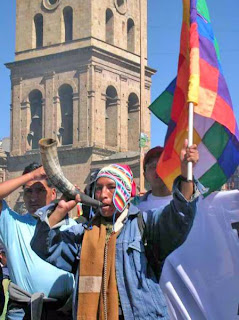Bolivia’s Transformation: The Victory of Evo Morales
Binoy Kampmark
It is a sometimes overly rich recipe, starched with violence and populism, but Latin American politics is something to behold. In the Americas, experiments have been run and tried with brutal consequences. Revolutions and counter-revolutions have been plotted and enacted. The good have tended to be a short time in office, while the coup d’état has had something of a long history.
Evo Morales’ victory in the Bolivian elections for a third term with just over 60 per cent of the vote is no minor achievement. Cement magnate Samuel Doria Medina received a paltry 25 per cent, something he blamed on the late entry of ex-president Jorge Quiroga, a move that potentially split the anti-Morales vote. Morales’ Movement Towards Socialism romped in, winning eight of the nine regions, including the affluent area of Santa Cruz. A remarkable achievement, given Morales’ own background as the son of peasant Altiplano farmers.
Victory for Morales in Santa Cruz also proved particularly sweet given its base for opposition to the MAS in 2008. Then, it was the aspiring Rubén Costas, co-founder of the right leaning Unidad Demócrata (UD), who attempted to fan the flames of secession. This, it was said, was also being facilitated by US money, be it through USAID or the National Endowment for Democracy. The latest victory has prompted Morales to quash claims that the country was one of half-moons “but a full moon”.
This victory is much more than a polling matter. The conflict between wealthy settlers and the indigenous populations has been the scar that never leaves, and a Morales victory did much to stare it down. (He, himself, is a native Aymara.) In 2009, he introduced a new constitution with a focus on indigenous rights and grants of greater autonomy. Then came the fiscal redistributions – income gathered from natural gas has been used in targeted programs. While the corruption stain lingers in its accusing tone, the country has not become the victim of dedicated kleptocrats. As long as the natural resource boom continues, Morales is on a purple patch. He knows, however, that such patches do turn colour in time. (This might be a literal statement, given the environmental costs of the Morales program.)
In the main, Morales has provided a copy book on the redistribution of natural wealth via the state pocket. Infrastructure projects connected with gymnasiums, schools and medical clinics have received funding through the Bolivia Cambia Evo Cumple program. Growth rates of 5.5 per cent this year, and 5 per cent for next, have been predicted by the IMF.
Measures of inequality have fallen even as inflation is being kept in check, and while Bolivia remains impoverished, it is barely recognisable as the once noted basket case run by a small ruling class hungry for coups. Half a million people have been pulled out of poverty. As if to prove a point, the country made a return to global credit markets in 2012, making its first bond issue since the 1920s, while issuing another in 2013.
Pragmatic socialism, as it has been termed, has not assumed that all sectors of the economy require nationalisation. The hydrocarbon reserves in May 2006 came in for special treatment, and the government coffers were promptly filled by increased state revenues of 285 per cent. But the banking sector is being left to its own devices – in the main. “We have never thought of nationalising the banking sector. As they are earning well, let them pay taxes.”
Such pragmatism would have surprised the late conservative William F. Buckley, Jr. of the National Review, who found the very notion, “in A.D. 2006, of aiming at reform by movement towards socialism” as “at best quaint.” Buckley did, however, provide Morales with something of a backhanded compliment. Even if the then newly elected leader was keen on socialising industries, he was also, when required, going to mount the soap box for free trade. This was particularly so over US policies to stamp out coca production. “Whose problem is it that many Americans use cocaine?”
Buckley’s own question – and he was at least good enough to suggest so – was whether the United States government did, in fact, have a right “to convert its own concern for weak-minded Americans into a veto power on Bolivian agriculture”. The only way was to “straighten up our disorderly theoretical house” and do business with Morales on the subject of protecting Americans.
In September 2006, Morales made a point before the United Nations General Assembly to hector Washington over its policies to criminalise coca production. With colourful defiance, Morales brandished the otherwise banned coca leaf during his speech.
The Morales victory cannot be seen in splendid isolation. As the Bolivian leader has himself conceded, such a polling result is not one that can be confined. It is, truly, a continental one that was already gathering pace when he was elected in December 2005. “There is a deep feeling, not just in Bolivia, but in the Americas, of freedom, of a triumph of the anti-imperialists.” Through the Bolivarian Alliance for the Americas, Morales has proven a busy presence.
The argument on indigenous rights is very much a broader argument of Latin American sovereignty in the face of meddling policies hatched in and implemented by Washington’s overly curious representatives. To those who see Latin America as both backwater and backyard, Morales had only one response: “Homeland yes, colonialism no.”
Morales did wish to dedicate the election victory to a few luminaries – those of “Fidel Castro and Hugo Chavez.” And the defiant rejection of Washington’s veto over Latin American regimes, be it through stealth or standard confrontation, continues.
Binoy Kampmark was a Commonwealth Scholar at Selwyn College, Cambridge. He lectures at RMIT University, Melbourne.
This article first appeared in Dissident Voice.
Subscribe to:
Post Comments (Atom)




No comments:
Post a Comment